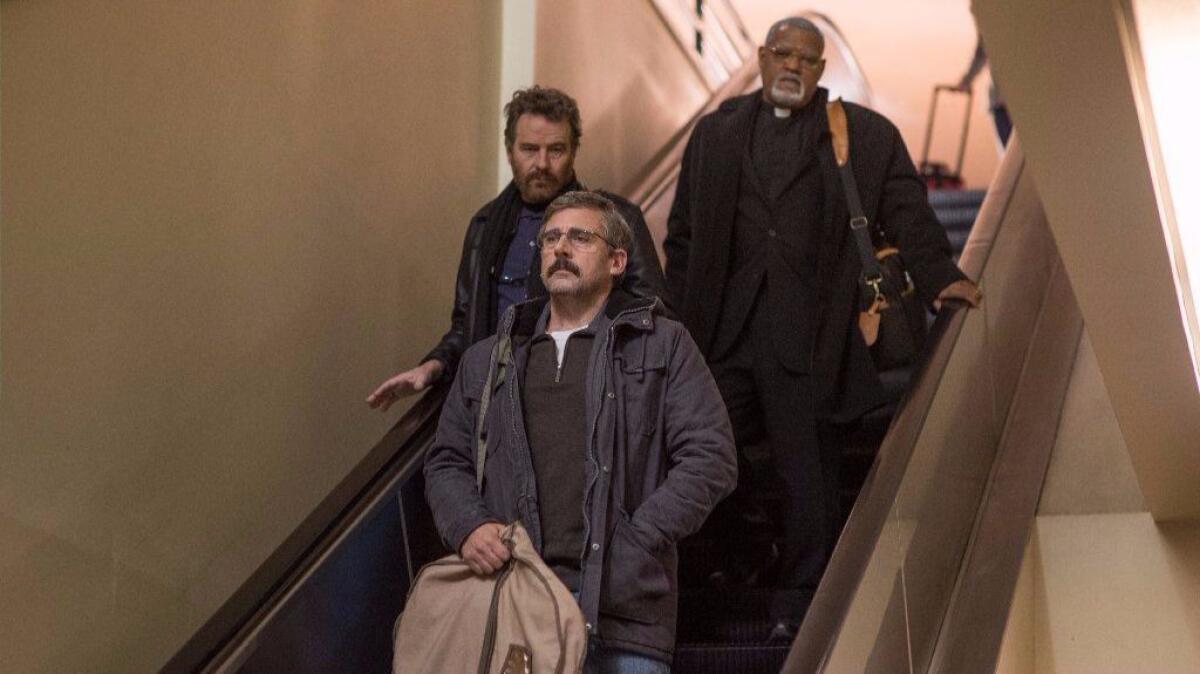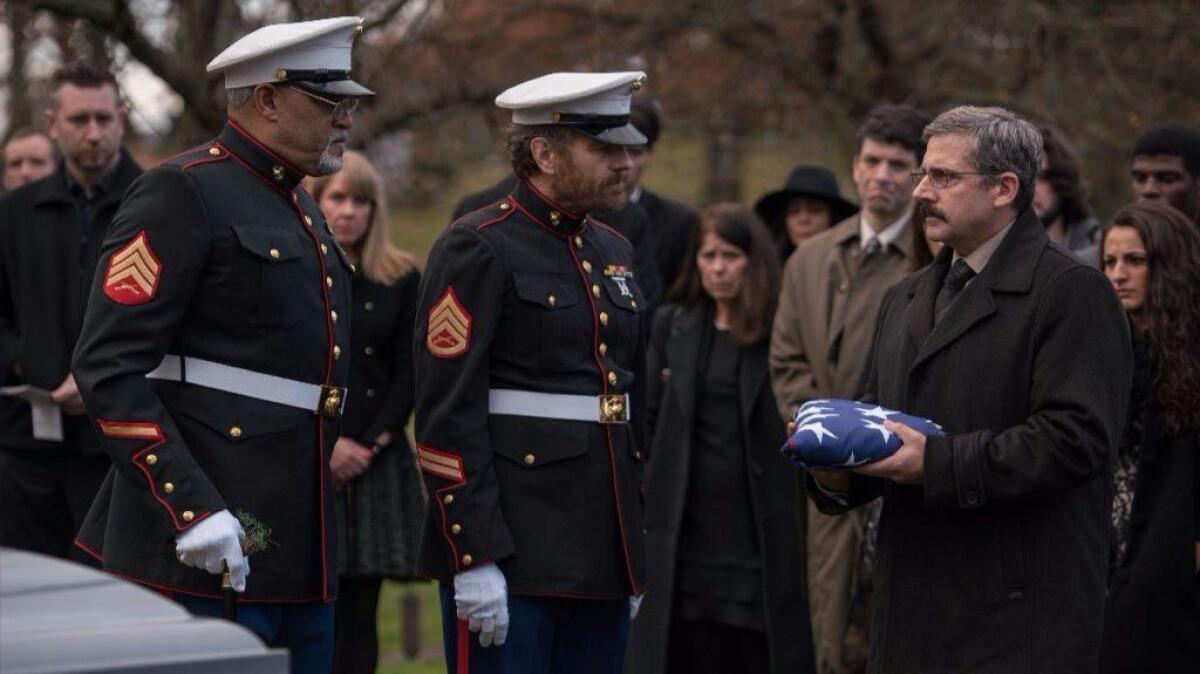Q&A: Richard Linklater on ‘Last Flag Flying,’ ‘liberal patriotism’ and finally making a middle-aged movie
- Share via
Let’s say you’re a director who has a heralded comeback with the final chapter of a three-part, 18-year romantic film series.
And you follow it up by releasing a 12-year epic project that nearly wins best picture.
Then, barely a year later, you make an underrated comedy derived from your own college baseball career.
You can’t really top all that if you’re Richard Linklater, the American auteur coming off the triple threat of “Before Midnight,” “Boyhood” and “Everybody Wants Some,” could you?
Yet here comes the 57-year-old, riding into award season with his low-key intimacies and profound digressions once again.
His new film is “Last Flag Flying” and — stop us if you’ve heard this before — it looks to be some of his most impactful work yet. Aging, masculinity, friendship, responsibility and war all come to the fore in the new feature, which opens the New York Film Festival at the end of September ahead of its theatrical release several weeks later.
FULL COVERAGE: Fall 2017 movie preview »
The quintessentially Linklatery piece — long takes, textured performances, casually philosophical dialogue — stars Bryan Cranston, Steve Carell and Laurence Fishburne as a group of Vietnam Veterans circa the start of the Iraq War who find themselves on a tragic (but still “Boyhood”-ishly humanist) road trip.
Resting on laurels is for lesser filmmakers.
The Times talked to the former slacker poster-child about his post-“Boyhood” career moment, the creative force that is the college reunion, tackling war in cinema and the rare experience of working with contemporaries.
Many of your movies, from your earliest work such as “Dazed and Confused” to pictures like “Boyhood” and “Everybody Wants Some,” are about young people facing an uncertain future. This one’s about older people facing an uncertain past. Why the shift?
Richard Linklater: I like the idea of three guys getting back together and what that means — what that reveals about you in relation to them but also in relation to yourself. It seems like a good mirror. In this case, Sal (Cranston) hasn’t really changed, and Mueller (Fishburne) has changed quite a bit, and Doc (Carell) is just sad-sacking along. It’s peeling the onion, this vast, huge deep emotional area, a road trip of three middle-aged guys.
You spent a lot of time with your old college baseball buddies making “Everybody Wants Some.” Did that period of reflection inform this film?
It actually did. It was being around all of them — guys I’ve known for 30-40 years, and when I’m around them the same roles from when we were young come back. Like, I’m the freshman and they’re the seniors. And the guys who are serious and the guys who are the jokers. That whole idea was fascinating, just in terms of who you are as a human being. Hearing that nickname from the past no one’s called you in a long time. It’s a version of you — not a lie, just a different shade of you. The relationships of old friends is always fascinating. Because of course it’s the long-term relation with yourself — how you’re the same and how you’re different.
FULL COVERAGE: Fall 2017 movie preview »

And you need a certain amount of time before that relationship means anything.
I most definitely could not have made this as a younger person. But then you go 25, 30 years, and it’s a long time, and then you realize it’s not a long time. Being older you say “gosh, I lived through movie cycles, through life cycles, through war cycles.”
You mention war. This movie is set only 14 years ago, and yet given what’s happened in this country since then it feels like another era. How relevant do you see its events to today?
This film has been in the works for a long time — since 2005-2006, really. Back then it would have been contemporary. I was sort of chasing the moment when the Iraq War was still going on. But I like the different vibe of what it would become; I kind of like examining a war a little more in retrospect, like all those World War I movies that came out in the 30’s or the World War II movies in the 50’s.
And that period after war is so telling because people’s attitudes change.
At least until the next one. As a little kid I remember Vietnam and the attitude about Vietnam and how it affected my generation. And that hangover kept us out of war. But then we see more time goes by, and it’s the ’80s and Reagan, and everyone’s rumbling up for war again. And then it doesn’t happen in the ’90s. And then 9/11 happens and we get the same thing, the same kind of misinformation — this time it’s weapons of mass destruction but that’s really just the Gulf of Tonkin incident again — and you feel the rush toward war and you know it’s going to be a disaster and all wrong but, well, here it comes.
One of the characters in the film — Sal, I think — notes how this is all a very familiar cycle. Different players and settings, but same narrative.
You live long enough you notice the cycle, the psyche, what
The industry is always shifting, and your own standing is shifting in it. I happen to have caught a good moment of my own trajectory.
— Richard Linklater

That whole question of ‘can you support the troops but oppose the mission’ is one that kept occurring to me throughout the film. How much are you trying to do that here? Do you feel like you can do that?
I think we learn as a culture to not judge soldiers in war. There was an overreaction to all the judgment in Vietnam and now we've gone to the other extreme where we’re not judging what they do at all. We’re just giving them total praise. It’s such a complex relationship, society’s relationship to the military. We’re thrust into this area where we have to be grateful for what they’re doing for us. That’s why I thought in this movie I’d be on safe ground if it came just from their perspective. Because anyone who’s served has the right to have their opinion.
And of course it’s a question of which war we’re talking about.
I think in particular when it comes to the Iraq War, history had changed quite a bit. Look at the [2016] Republican debates. Almost everyone said the war was a mistake — the one guy who didn’t was the one whose brother started it. The culture shifted, like it did on Vietnam. A conservative-ish friend of mine saw this film and he said it felt like “liberal patriotism.” I wasn’t sure exactly what he meant, but I kind of got it. You can question the war but still have all these warm feelings about your country. The guys in the movie talk about it in this one scene — “I love this country, it’s a great country, but you gotta have a reason to love it.” And that reason is “don’t get lied to.”
I want to address “The Last Detail” of this. People have been touting it as a sequel because it picks up the arcs of characters from that 1973 Hal Ashby-Jack Nicholson film, and it’s based on a book that the author, Darryl Ponicsan, intended as a sequel. Do you see it as one?
It’s funny, no one associated with the movie has ever mentioned “The Last Detail.” That comes from the outside. Can you have a sequel with guys who are not named the same, and different actors, with everything else so different? What does a sequel even mean then? I don’t mean any disrespect to “The Last Detail” because it’s one of the great ’70s movies. But it’s very different. I guess the most you can say [is] there’s a little bit of an echo. But it’s not a sequel.
This movie seems to be part of a post-“Boyhood” renaissance for you—this idea that “Hey, my stock is high, now’s a great time to try to get some of these scripts I wrote in a leaner time greenlit, work my way through the pile,” as you’ve said before. Is that still happening?
I’m still doing that. Also with “Where’d You Go, Bernadette” [the movie he’s currently shooting in Vancouver, with Cate Blanchett ], which I’d been trying to get made for a while. It’s a nice companion piece in some way to “Last Flag.” It’s a middle-aged woman and she’s having to deal with early success and perceived crisis. It’s a nice change after the last few, which are real “bro” movies.
[Laughs] I mean, the pile is still deep, but it is getting smaller. The industry is always shifting, and your own standing is shifting in it. I happen to have caught a good moment of my own trajectory. The industry is strong right now. You go back to ’09 or ’10 and it was a barren wasteland. If I was trying to get “Bernie” made now, it would be a Netflix movie instead of what I did, which is piecing it together with 30 fly-by-night financiers and splotchy distribution. But as we see with some of the characters in “Last Flag,” you never know when or where things could shift again. New realities always loom.
This story is part of our fall 2017 movie preview. Check out the complete coverage here.
Only good movies
Get the Indie Focus newsletter, Mark Olsen's weekly guide to the world of cinema.
You may occasionally receive promotional content from the Los Angeles Times.








